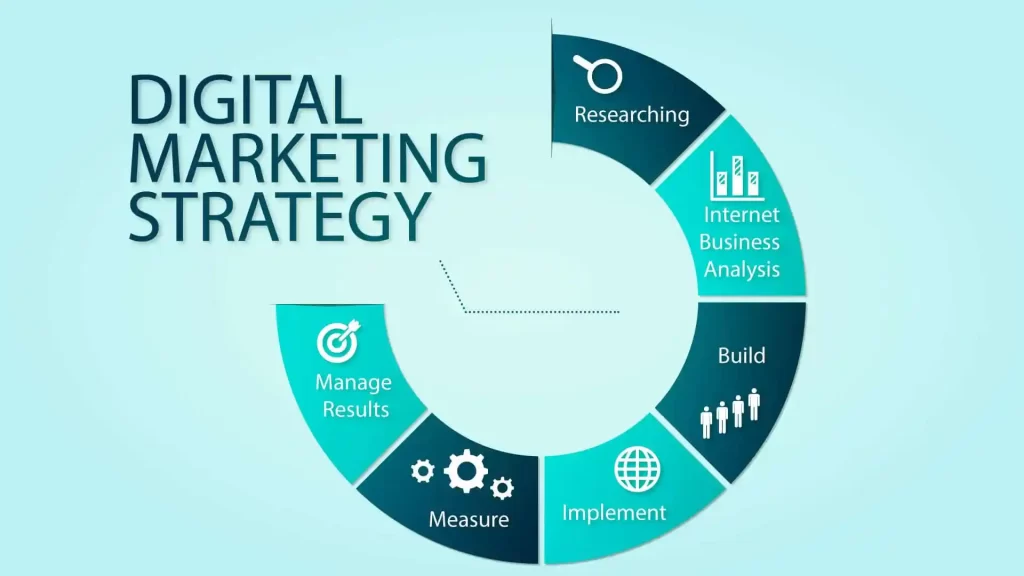Digital Marketing Strategy Framework…
Businesses need structured approaches to achieve their marketing goals. A digital marketing strategy framework offers a systematic method for planning, executing, and optimising marketing campaigns. As we head into 2024, staying competitive means embracing these frameworks to ensure efficient resource allocation, targeted messaging, and adaptability to market changes.

What Is a Digital Marketing Framework?
A digital marketing framework is a structured methodology that helps businesses outline their marketing strategies in a coherent, goal-oriented manner. It provides a roadmap for engaging with customers, optimising campaigns, and analysing performance across various channels. By using a framework, businesses can ensure that their marketing efforts are aligned with broader business objectives, making it easier to deliver personalised content and adapt to shifting consumer behaviours.
For example, implementing frameworks that integrate AI and data-driven insights can significantly enhance a company’s ability to personalise marketing efforts, leading to improved customer engagement and higher conversion rates. Businesses looking to stay ahead in the digital marketing landscape should consider exploring AI-powered tools and frameworks to boost their marketing strategies source.
The Importance of Using Digital Marketing Frameworks
Digital marketing frameworks are essential for several reasons:
- Clarity and Direction: Frameworks break down complex processes into manageable steps, allowing teams to focus on key objectives. They provide a clear path from strategy development to execution, ensuring that every marketing activity aligns with business goals.
- Enhanced Market Insight: By using frameworks, businesses can stay updated with the latest trends and technologies. This insight allows for more informed decision-making, ensuring that marketing strategies remain relevant and effective.
- Efficient Resource Allocation: Frameworks help prioritise tasks and allocate resources effectively. They ensure that marketing budgets are spent on activities that yield the highest ROI, avoiding wasted effort on less impactful initiatives.
- Improved Optimisation and Analytics: Digital marketing frameworks are designed with continuous optimisation in mind. By regularly analysing performance data, businesses can refine their strategies, leading to better outcomes over time.
Incorporating frameworks into your digital marketing strategy not only streamlines your operations but also enhances your ability to respond to changes in consumer behaviour and technological advancements source.
Most Popular Digital Marketing Frameworks
Here’s an in-depth look at some of the most widely adopted frameworks in 2024:
- The Flywheel Model
The Flywheel Model shifts focus from the traditional funnel to a more dynamic, customer-centric approach. This framework emphasises continuous customer engagement, where satisfied customers drive referrals and repeat business, fuelling growth. By creating positive feedback loops, the Flywheel Model turns customers into advocates, helping to sustain momentum source.
- The STP Model
Segment, Target, and Position (STP) is a powerful framework that helps businesses identify and cater to specific market segments. By tailoring marketing strategies to distinct groups, companies can create more personalised and effective communications. The STP model is particularly useful in competitive markets where differentiation is key source.
- Pirate Metrics (AARRR)
Originally developed for startups, the Pirate Metrics framework tracks five key stages of the customer journey: Acquisition, Activation, Retention, Referral, and Revenue. This model is crucial for businesses aiming to optimise customer engagement and conversion rates. By focusing on these metrics, companies can identify bottlenecks in their customer journey and make data-driven improvements source.
- Forrester’s 5 Is
Forrester’s 5 Is framework focuses on building strong online communities by prioritising Involvement, Interaction, Intimacy, Influence, and Individualisation. This approach helps businesses create deeper connections with their audience, fostering loyalty and advocacy. Brands like Amazon utilise this framework to deliver personalised experiences that drive customer satisfaction and retention source.
- The Hook Model
The Hook Model, popularised by Nir Eyal, is designed to create habit-forming products. It follows a four-step cycle: Trigger, Action, Variable Reward, and Investment. This framework is particularly effective for digital products and services where repeat engagement is crucial for long-term success. By understanding and applying this model, businesses can drive user retention and foster customer loyalty source.
- RACE Planning
The RACE (Reach, Act, Convert, Engage) framework provides a comprehensive guide for digital marketing activities across multiple channels. It helps businesses map out their customer journey, from initial engagement to conversion and beyond. The RACE model is particularly useful for integrating digital marketing efforts, ensuring that every stage of the customer journey is optimised for maximum impact source.
- McKinsey’s 7S Model
McKinsey’s 7S Model is a classic framework that remains relevant in 2024. It focuses on seven interdependent elements: Strategy, Structure, Systems, Shared Values, Skills, Style, and Staff. This model helps businesses align their internal processes with their marketing goals, ensuring that all aspects of the organisation work together harmoniously source.
- Marketing Funnel
The traditional Marketing Funnel remains a staple in digital marketing strategies. This framework guides businesses in mapping out the customer journey from awareness to purchase. By optimising each stage of the funnel, companies can increase conversion rates and drive more revenue. Despite the rise of newer models, the funnel remains a foundational tool in marketing strategy development source.
Conclusion
Incorporating these digital marketing frameworks into your 2024 strategy is crucial for staying competitive in a rapidly evolving landscape. Each framework offers unique advantages, from enhancing customer engagement to improving resource allocation.
By selecting the right frameworks and tailoring them to your business needs, you can streamline your marketing efforts, improve performance, and achieve sustainable growth.
For more information on these frameworks, visit the DesignRush article.
- Technology Company Revenue Growth Tactics: Proven Strategies for Success - 2nd November 2024
- IT Sales Lead Generation: Proven Strategies to Drive Success in the Tech Industry - 1st November 2024
- Mastering Lead Generation for IT Companies: Strategies to Drive Results - 1st November 2024







